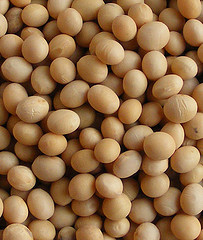
flickr.com/fotoosvanrobin
In this day of nutritional supplements and health awareness, people know relatively little about the numerous lecithin benefits. Read on to understand more about this amazing element:
Lecithin is important to your good health for many reasons. It acts as an emulsifier, breaking up cholesterol and fats. It normally helps to maintain a healthy heart. Generally, it is a source rich in gamma linoleic acid (GLA) and has the highest (98% or more) concentration of phosphatide available. Lecithin helps the body to utilize vitamins A, D, E, and K and is excellent for maintaining strong memory and concentration. Lecithin benefits include a cleansing of the kidneys and liver, and help the body to absorb nutrients. To top it all off, lecithin can be easily combined into your favorite salads, drinks, nut butters, spreads and sauces.
For all of the wonderful benefits of lecithin, it can be hard to believe that it is in fact nothing more than a byproduct of the humble soybean. After all, a byproduct, is little more than waste. So, why does this “waste” product contain plenty of health benefits? The answers lie in the theory behind the amazing lecithin.
Origin and History
The word lecithin is taken from the word lekithos, which is Greek for “egg yolk.” It was given that name because lecithin was initially discovered in 1850 when French scientist Maurice Gobley isolated the compound from an egg yolk. For years after its discovery, people got their source of lecithin from egg yolk. Then it was discovered, in the middle of 1930s, that lecithin could be found in the waste products of soybean processing. This discovery changed the whole face of commercial lecithin.
Today, most of the commercial lecithin we see on the market comes from soybeans. Lecithin is generally a powerful emulsifier. Since its first discovery, lecithin has been widely marketed in the commercial sector as an emulsifier, used chiefly in the food industry but also as an ingredient in products such as pharmaceuticals and paints.
Lecithin Advantages
Lecithin is used as a synonym for phosphatidyl choline (PC) in the scientific community. This compound is believed to be responsible for all of the lecithin benefits, particularly its medicinal effects.
When we consume phosphatidyl choline, the compound is broken down into a nutrient commonly known as “choline”, considered to be an essential nutrient. The nutrient is considered to be “essential” because our bodies cannot produce their own supply of choline. Instead, we must rely upon the foods we eat to maintain appropriate levels.
Lecithin is an important component of cell membranes. Essentially, it defines the very structure of cells. One of the major lecithin benefits is to maintain the integrity of cell membranes, helping to facilitate the movement of fluids inside and outside the cell.
As a component of bile, lecithin usually emulsifies fats. If you’ve spent any time at all in the kitchen, you’ll already learn how fats react to certain conditions. When exposed to low temperatures, fats tend to turn white and go into a semi-solid condition. However, when exposed to high temperatures, they turn completely liquid. Think about what would happen to our bodies if our fats, or lipids, were to undergo these same changes at the slightest change of temperature. Perhaps the most important of the lecithin benefits is its emulsifying action, keeping fats properly maintained and balanced.
Lecithin is also a component of the myelin sheath, which is the thin covering that creates a protective layer for our brain cells and spinal chord. In addition, some studies have shown that one of the lecithin benefits is to facilitate cell signaling, that is the process by which cells communicate with each other to maintain and improve bodily functions.
There is no question that lecithin promotes our health in many ways. In fact, from the way we digest our foods to the longevity of our hearts, lecithin benefits are some of the most important factors to keeping us healthy.
Tagged with: lecithin benefits • soya benefits
Filed under: Lecithin